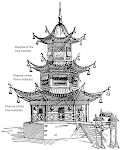Another asked, "What is enlightenment?"
That's the question.
Enlightenment is an English word used to translate the Sanskrit word bodhi.
Cologne Digital Sanskrit Lexicon:
1 bodhi mf. (with Buddhists or Jainas) perfect knowledge or wisdom (by which a man becomes a Buddha or Jina) , the illuminated or enlightened intellect (of a BñBuddha or JñJina) Katha1s. Ra1jat. S3atr. Lalit. (cf. MWB. 97 , 188 &c.) ; m. the tree of wisdom under which perfect wñwisdom is attained or under which a man becomes a Buddha , the sacred fig-tree , (Ficus Religiosa) Hcat. (MWB. 35 , 181 &c.) ; `" wakener "' , a cock L. ; N. of a man (= Buddha in a former birth) Ja1takam. ; of a mythical elephant Lalit. ; of a place L. ; pl. N. of a people R. ; mfn. learned , wise Un2. iv , 117.
2 bodhi f. (with Buddhists) perfect knowledge or enlightenment MWB. 43 (%{-dhy-aGga} n. an `" integral part of perfect knowledge or enlightenment "' Lalit.)
In English and European history "enlightenment" represents the view advocating reason as the primary basis of authority as the answer to the prior view that Biblical revelation was a sufficient basis of authority.
Likewise, Buddha's teaching also was in a way a reaction to the Brahmanic reliance on the tradition of revelation. Buddha was not satisfied with revelation as an answer to the question of life's suffering, and he sought out direct personal experience for authority Also, because Buddha did not set himself up as a new revelation, his teaching about his own Dharma was not to follow the Dharma based on mere belief or authority but to test it for oneself and to use reason to evaluate it. Thus, the Dharma and Buddha's awakening easily fit into the cultural framework of the Enlightenment.
A Buddha is someone who is awakened to complete perfect wisdom or knowledge(bodhi) and thereby liberated from the fetters of life and existence and who reveals or teaches the method of awakening to knowledge to others.
It is interesting to note that the term bodhi meaning knowledge could just as easily be translated as "science". Note that in the first definition of science, it means "knowledge as distinguished from ignorance" which is a pretty good definition of bodhi.
Main Entry: sci·ence
Pronunciation: \ˈsī-ən(t)s\
Function: noun
Etymology: Middle English, from Anglo-French, from Latin scientia, from scient-, sciens having knowledge, from present participle of scire to know; perhaps akin to Sanskrit chyati he cuts off, Latin scindere to split — more at shed
Date: 14th century
1: the state of knowing : knowledge as distinguished from ignorance or misunderstanding
As science depends on its scientific method for practitioners to verify its truths for themselves, Buddhism depends on its method for practioners to verify its truths for themselves. Unfortunately, many people forget the importance of bodhi as the knowledge arising from the experience rather than the words or teachings expressing that knowledge.
In other words, people of today turn Buddha's Dharma into a new form of revelation and worship the words of the Dharma forgetting that the core of the Dharma is the method of practice to awaken bodhi for oneself. Buddha's observations are expressed for the benefit of beings, not for the purpose of becoming a new snare with which to trap beings in the net of dogma. To turn the words into a body of knowledge to be enshrined as if they were more important than the experience of knowledge is a mistake that occurs in both science and Buddhism.
I'm not saying that Buddha's enlightenment or bodhi is the same as Western science. Science is the knowledge of how cause and effect works from the materialist perspective. Bodhi is the knowledge of not only how cause and effect work as a psychologically ethical matter but also how cause and effect may be transcended from the awakened perspective. But essentially both science and bodhi mean a knowing that dispells ignorance.
Is there anyone actually enlightened right now?
Yes of course there are. There are many people who have some knowing of the truth of bodhi. Bodhi is not something that it all or nothing. So though there are many people who have some awakening, they do not necessarily have the complete depth of enlightenment as Shakyamuni had.
But to attempt to count the number of enlightened beings is an endeavor that is bound to ignorance as it is a perspective that becomes more and more entangled with the delusive mindset of subject and object. It is only one's own enlightenment that really matters as the way of dispelling one's own ignorance with bodhi.
Not a single arhat who lived with Shakyamuni during his lifetime realized bodhi because of some special magic of the Buddha. Each had to do the work him or herself to realize bodhi for him or herself. The Buddha's words were only the map to guide them. So it is today, even if one finds an enlightened being, the mere fact of discriminating the "other" being as enlightened while oneself is seen as ignorant, can become an obstacle for one's own enlightenment.
There is one who is enlightened right now. Do you know that one? Where will you look for that one?
There is a Zen koan about that one. Master Baizhang all the time was working with the assembly of monks. Someone asked him, "Work, work, work, all day long. Why do you work so much?" Baizhang said, "I do it for another." The next question was "Why doesn't he do the work for himself?" Baizhang answered, "Because that one has no hands."


